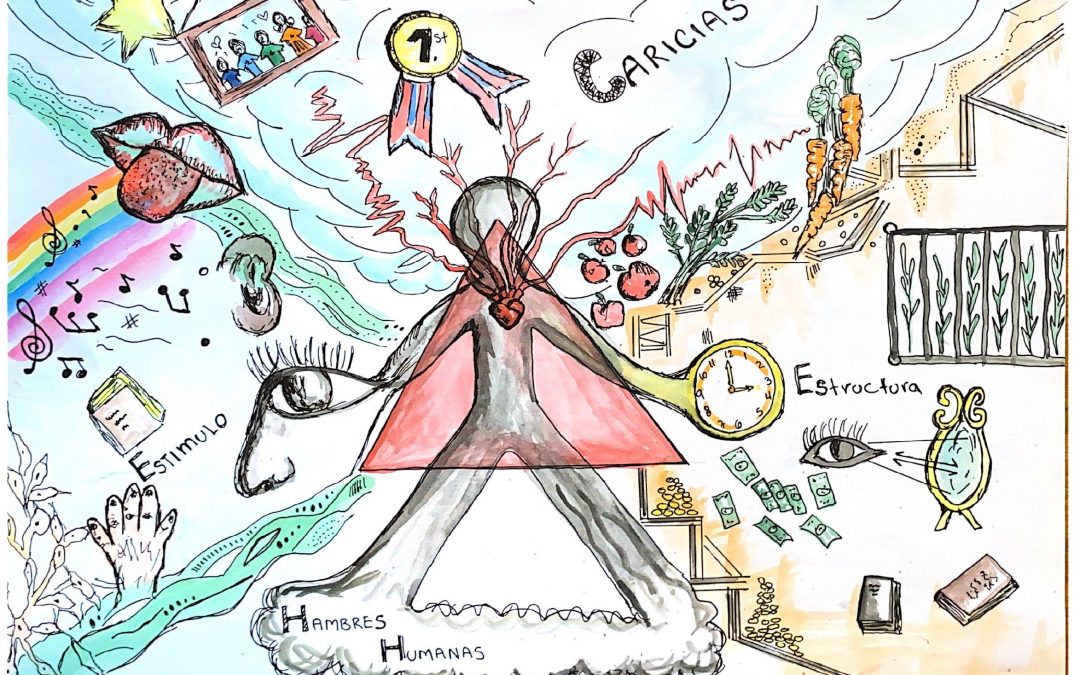Covid is exhausting in a number of ways. When many of my UK friends are grappling with more lockdowns and restrictions, we are blissfully immune to it in Guatemala through sheer ignorance. There is no reliable data and we can only roughly guess how good or how bad things really are. Regardless of our circumstances, one thing is sure: Covid will not disappear overnight. We desperately need compassion, grounding, hope, and meaning to keep going. I realise you may want to shove these words right back at me now because these abstract terms seem to be difficult to practically translate into more expansive states of mind. The question is how to make the abstract accessible and palatable… Just like babies need a particular type of diet, as grown ups we need the right input so that we can go about our lives feeling O.K. With this in mind, I would like you to pause and consider…
How do you feed yourself physically and emotionally?

you feed yourself everyday with your experience
Let’s take it further and connect the dots. In another post I quoted the works of Esther Perel who urges us to dive into the erotic during times of crisis. We are not talking here about sex as such. The erotic, in the broad sense of the word, is about being curious, alive, open to pleasure, contemplation and vitality. Sexually speaking, eroticism is the story we put on the experience of physical intimacy. More broadly, this is an open attitude to life as it is… present in the smile of a stranger or in the quiet sense of wonder when exploring a place never seen before.
Eroticism from the point of view of transactional analysis falls into the domain of human psycho-biological needs or hungers. Eric Berne put forward three categories of hungers: stimulus, recognition and structure.
Stimulus hunger
As babies we crave physical and emotional stimulation such as touch. The lack of it is adverse and leads to permanent damage to the nervous system as demonstrated by the studies of babies from Romanian orphanages in the 1940ies carried out by René Spitz. Stimulus seeking is our basic motivator. After all, nobody wants to have a boring life. You know that feeling on a Sunday afternoon when you’re restless and wondering what to do with yourself? This is a symptom of being understimulated. Throughout the pandemic we are prone to Covid fatigue caused by the lack of stimulation – we feel fed up, bored, fidgety, sleepy and agitated at the same time. Humans need stimulation, be it positive or negative, to feel alive and at ease. However, Goldilocks principle applies. Not too much, not too little, just right! A prime example is Zoom fatigue. Research in neurobiology shows that we feel exhausted from videoconferencing because of the excessive amount of visual and auditory stimuli. In regular conversations we can tune in and out, doodle and fidget a bit. When we get bombarded with so many faces in our personal space and see our reflection in the camera, we eventually get into overdrive and feel drained. That’s why many psychologist advise to turn off your Zoom camera at times, keep a distance from the computer or even use only audio to give yourself a rest.

What are your sources of stimulation?
Recognition hunger
It doesn’t stop here… when you’re feeling restless on that Sunday afternoon, you might start browsing your phone and look for candidates for some good old chit-chat. This is the hunger for recognition coming to the surface – the need to be seen, loved, refered to, listened to and appreciated. In clever psycho-language, the hunger for recognition is a sublimation of the stimulus hunger. In other words, when you’re bored, you’ll try to talk to people to feel connected, entertained and important. One thing to keep in mind is that in the absence of positive recognition, we unconsciously seek negative recognition. That’s why couples fight when they don’t have enough affection, that’s why kids chat and get told off when the class is dull and the teacher shows no interest in them. On the other hand, when we receive too much recognition and over-rely on being seen in a positive light by our boss, we can get egocentrical, stressed or anxious. When we don’t receive the fix of attention we start to get worried and doubt ourselves unnecessarily. Again, the trick is to have enough (not too much, not too little!) recognition for what we do (work) and who we are (love). Sigmund Freud echoed this when stating that
“Love and work are the cornerstones of our humanness.”
Structure hunger
None of this happens in the vacuum: we are suspended in personal, family, organisational, political, national and global structures. We meet our needs for stimulation and recognition within a range of paramentres. We require structure to our idenities so that we know who we are. We require order to our days, weeks, months and years. When the pandemic hit and we lost our beloved (sometimes resented previously) routines, many people reported feeling anxious and disoriented… That was a result of having our structures dissolve before our eyes. We had to reinvent ourselves and find new routines and figure out who we wanted to be in the midst of Covid. We had to replace external structures with internal discipline, for better or worse. Prior to the pandemic, some of us felt stifled by their rigid structures, while others wished for more order to their lives. Once more we are back to the Goldilocks principle.
(click on the picture to see a bit more ![]() )
)
balancing recognition, stimulation and structure is at the core of your wellbeing
It’s about balance
Regardless of Covid, you need to stay well fed, you need the right combination of recognition, stimulation and structure so that your life has the oomph factor. You may want to seek sources of stimulation that are healthy and fun. It’s all about balance. If you are considering having gin & tonic at 9 am to feed stimulus hunger, perhaps you need more recognition. Maybe the lack of touch and regular human contact is driving you crazy. How can you up your recognition then? How could you connect with your friends? Perhaps you lack some healthy discipline? Maybe there is nothing to push against or complain about? After all, many of us enjoy the sense of liberation on a Friday afternoon when work is sorted and we leave behind the structures of the week. Do you see how it works? You can find the right combination of stimulus, structure and recognition that genuinely meets your needs, without any sneaky compensation such a delving into work to escape an unsatisfying relationship that gives you no recognition whatsoever.
Now comes the cherry on top of the cake. Going back to eroticism as a fundamental strategy for surviving AND thriving during the pandemic, we need to direct our hungers towards the erotic. Ponder the following:
What type of stimulus makes you feel alive, curious and healthy?
Who are the people that invite you to feel alive, curious and healthy?
What do you need to include in your routines to feel alive, curious and healthy?
Covid is not going to disappear very quickly and we still need patience to face lockdown fatigue, keep our social distancing and wash our hands. This does not mean that there is no space for joy. On the contrary, the structures we weave these days should stem from the erotic. The meanings we make can support us to thrive. Unfortunately, many people suffer sub-depressive states resulting from unsatisfied psycho-biological hungers. A lot of us feel somewhat under the weather and not quite with it. The antidote lies in our conscious effort to uncover what meaning we can give to our experiences, so that they are not only bearable but also lively. A slight attitude of amusement can go a long way and support us to rise above the circumstances we face. Eric Berne (1970, Sex in human loving) gave us a useful tip that I’ll leave to digest:
“… the road to freedom is through laughter, and until he learns that, man will be enslaved, either subservient to his masters or fighting to serve under a new master. The masters know this very well, and that is why they are masters. The last thing they will allow is unseemly laughter.”
Arts credit for Enrique Marquez for his depiction of human hungers at the beginning of the post.




Wonderful reminder of the need to dive into and recognise our erotic selves Thankyou.
Thank you Jenny. The Spring is around the corner and our erotic selves can be nourished in a number of ways 🙂
This is great! Striving for a better today balancing structure with our erotic selves
Wonderful words that motivate me to look for my hungers again & nourish them.